Ukraine crisis: Military observer freed in Sloviansk
- Published
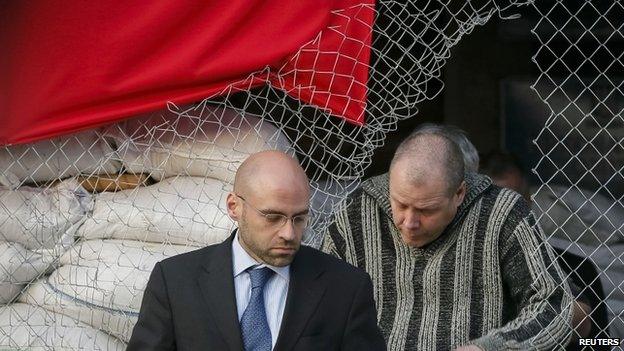
The other seven members of the team are still being held in Sloviansk
Pro-Russian separatists in eastern Ukraine have released one of a team of eight European monitors seized in the flashpoint city of Sloviansk.
The officer, a Swede, was freed on medical grounds, it has been confirmed.
The monitors were shown to the media on Sunday - a move described as "revolting" by Germany, the native country of four of the team.
The remaining seven are still being held and diplomacy continues to try to secure their freedom.
There is no word about a number of Ukrainian military officers who were seized along with the group.
In eastern Ukraine, gunmen continue to occupy official buildings in a dozen cities, defying the government in Kiev.
In other developments:
Separatists in Donetsk have seized control of the regional TV and radio headquarters, demanding broadcasts by a Russian channel be switched back on, in place of Ukrainian-language services
US President Barack Obama said the Kremlin had "not lifted a finger" to implement last week's deal in Geneva aimed at easing the crisis
Pro-Russian gunmen said they captured three Ukrainian security services members overnight in eastern Ukraine. Kiev later confirmed a number of its officers had been detained
Mikhail Khodorkovsky, Putin opponent and former Russian oil tycoon, visited Donetsk on Sunday but was refused entry to the rebel-held city hall.
Meanwhile, the US and EU are preparing to unveil new sanctions against Russia, accusing it of destabilising Ukraine.
'Not prisoners of war'
The foreign observers - operating under the auspices of the Organization for Security and Co-operation in Europe (OSCE) are from Germany, Poland, Sweden, Denmark and the Czech Republic.
They were shown to the media on Sunday, led into Sloviansk town hall by masked gunmen.
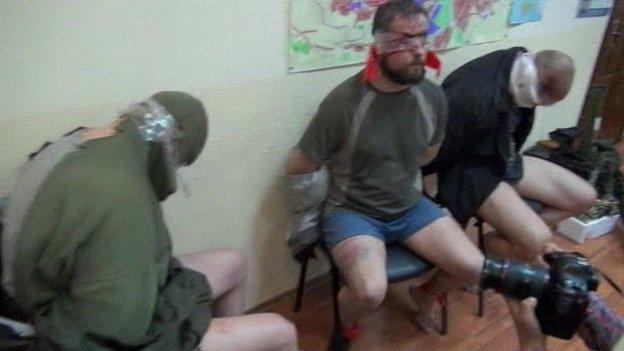
Militia leaders also said they had captured three Ukrainian security service members overnight
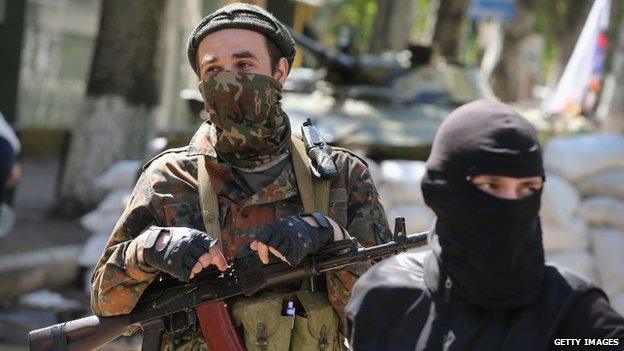
Pro-Russian gunmen continue to occupy official buildings in a dozen cities in eastern Ukraine
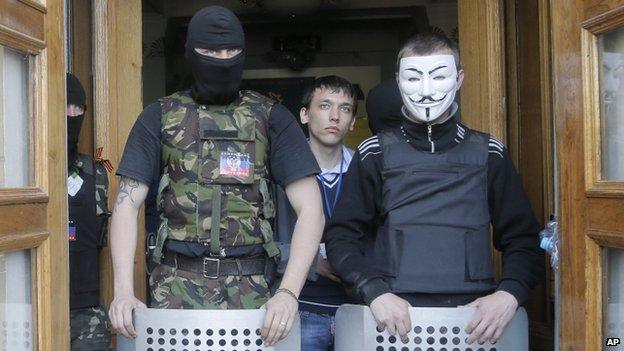
In the latest seizure to be reported, pro-Russian activists stormed the regional TV centre in Donetsk
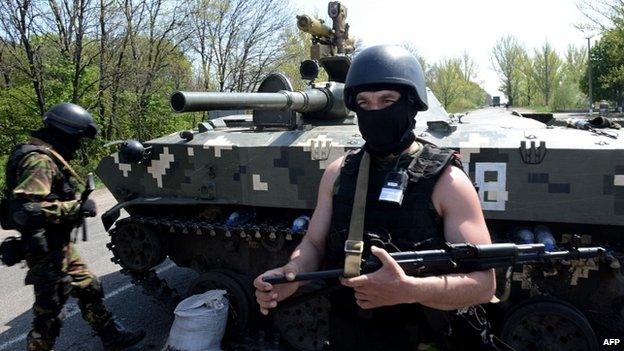
The Ukrainian army has been building up a presence around Sloviansk
German monitor Col Axel Schneider, who spoke for the group, stressed they were not Nato officers - contrary to claims made by the separatists - nor armed fighters, but diplomats in uniforms.
"We are not prisoners of war. We are the guests of (self-declared Sloviansk) Mayor (Vyacheslav) Ponomaryov, and being treated as such."
Reporters later saw one of the group - accompanied by two men - get into an OSCE vehicle which then drove away.
A spokeswoman for Mr Ponomaryov told Reuters the Swedish national who was freed "has a mild form of diabetes and so we decided to let him go".
Germany strongly criticised the group's appearance before the media.
"The public parading of the OSCE observers and Ukrainian security forces as prisoners is revolting and blatantly hurts the dignity of the victims," said a statement (in German), external from Foreign Minister Frank-Walter Steinmeier.
Mr Steinmeier added that Russia had a duty to "influence" the separatists" so that the other members of the mission can be freed as soon as possible
The monitors who were captured are not part of the main OSCE mission in Ukraine, which Moscow agreed to.
The eight monitors were shown to the media on Sunday
They are from individual OSCE countries, invited to Ukraine by the Kiev government, says the BBC's Bethany Bell in Vienna, where the organisation has its headquarters.
Earlier, Mr Ponomaryov said there was the possibility of exchanging the monitors for militia members held by the Kiev government.
Russia, an OSCE member, has pledged to "take all possible steps" to secure the observers' release.
Kiev has accused the militia of using the Europeans as a "human shield".
The West has blamed Moscow for fomenting a secessionist revolt in eastern Ukraine after it annexed Crimea last month. Moscow denies the claim.
Russian Foreign Minister Sergei Lavrov said Ukraine must end military operations in the east of the country as part of urgent measures to defuse the crisis.
